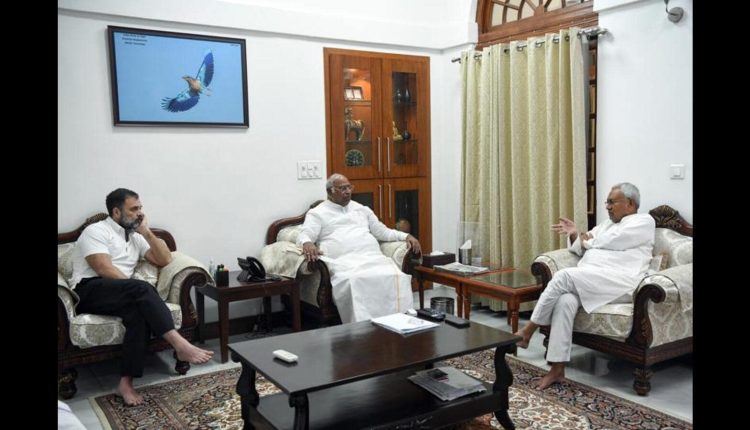Performance in the last three polls, state or national, could form the basis of seat sharing among the motley group of political parties whose leaders are meeting in Patna on June 23 in their bid to forge a coalition to challenge the ruling BJP in the 2024 parliamentary elections, according to a formula likely to be proposed by the Janata Dal (United) and the Rashtriya Janata Dal (RJD), the two main constituents of the ruling alliance in Bihar, people familiar with the matter said.
The performance could be assessed both in terms of the vote share of a party as well as the number of seats it won, according to leaders of the mahagathbandhan, as the ruling alliance in Bihar is called.
Leaders of around 15 parties, including Congress’s Rahul Gandhi and party president Mallikarjun Kharge, Trinamool Congress chief and West Bengal chief minister Mamata Banerjee, Samajwadi Party chief Akhilesh Yadav, Tamil Nadu CM M K Stalin, Jharkhand CM Hemant Soren, Delhi CM Arvind Kejriwal, former Maharashtra CM Uddhav Thackeray and NCP chief Sharad Pawar, besides top Left leaders, are due to attend the Patna meet, which has been called by Bihar chief minister and JD-U’s de facto supremo Nitish Kumar, a former ally of the Bharatiya Janata Party (BJP).
“It would be a useful methodology to avoid disputes over seat sharing, especially between regional parties and Congress in states where the latter is in alliance with regional parties, like in Bihar and Jharkhand,” said a mahagathbandhan leader, not willing to be named.
An RJD leader said the formula could also work in states such as West Bengal and Uttar Pradesh, where seat sharing between Congress and regional allies like TMC and Samajwadi Party will be no easy task.
Speculation is already rife that Congress is keen on staking claim on at least 350 Lok Sabha seats across the country.
Another mahagathbandhan leader said the formula gives weightage to a party that has won higher number of seats despite getting a smaller vote share compared to its ally. This, according to the leader, could help JD(U) get more seats as compared to RJD in Bihar, which drew a blank in the state in the 2019 Lok Sabha elections though it performed better than JD (U) in 2015 and 2020 assembly polls.
JD(U), which realigned with RJD in August 2022 after snapping ties with BJP, had won 16 Lok Sabha seats in 2019 as a constituent of the National Democratic Alliance (NDA). In the 2020 assembly polls, the party won only 43 seats whereas RJD (then in opposition) won 75 seats and Congress 19.
Mahagathbandhan leaders say a similar methodology was used for seat sharing among constituents which had joined the Janata Party-led alliance in 1977 and trounced the Congress in the parliamentary elections that year.
Bhola Yadav, national general secretary of the RJD, said, “Once the front takes shape, the exercise of seat sharing would be done. We will apply the method of assessing the strength of each party based on a formula and of course, vote share would be a part of it,” he said.
K C Tyagi, chief spokesperson of JD(U), said there would be a mechanism to decide the seat allotment among allies, but at the moment, the June 23 meeting is significant as it would show how CM Kumar’s bid to unite the opposition, along with Congress, is bearing fruit.
“We have identified around 450 seats where there is a scope of straight fight between opposition and BJP on the ‘one against one’ formula,” he said, referring to the proposal to field one candidate from a united opposition against the BJP nominee.
Political observers, however, are less enthusiastic about the formula.
Nawal Kishore Choudhary, former principal of Patna College, said, “Politics is not arithmetic where two plus two adds to four. There are other challenges. The front would have parties which play identity politics and have regional dominance in their respective states. The seat sharing would be a complex process,” he said.
Choudhary also emphasised that the scenario was different in 1977 when many opposition parties had merged to form Janata party. “Over the past four decades, regional parties have grown and have their own identity. Unless there is sacrifice of their egos and dynastic interests, it is unlikely that the parties would agree on common terms,” he said.


